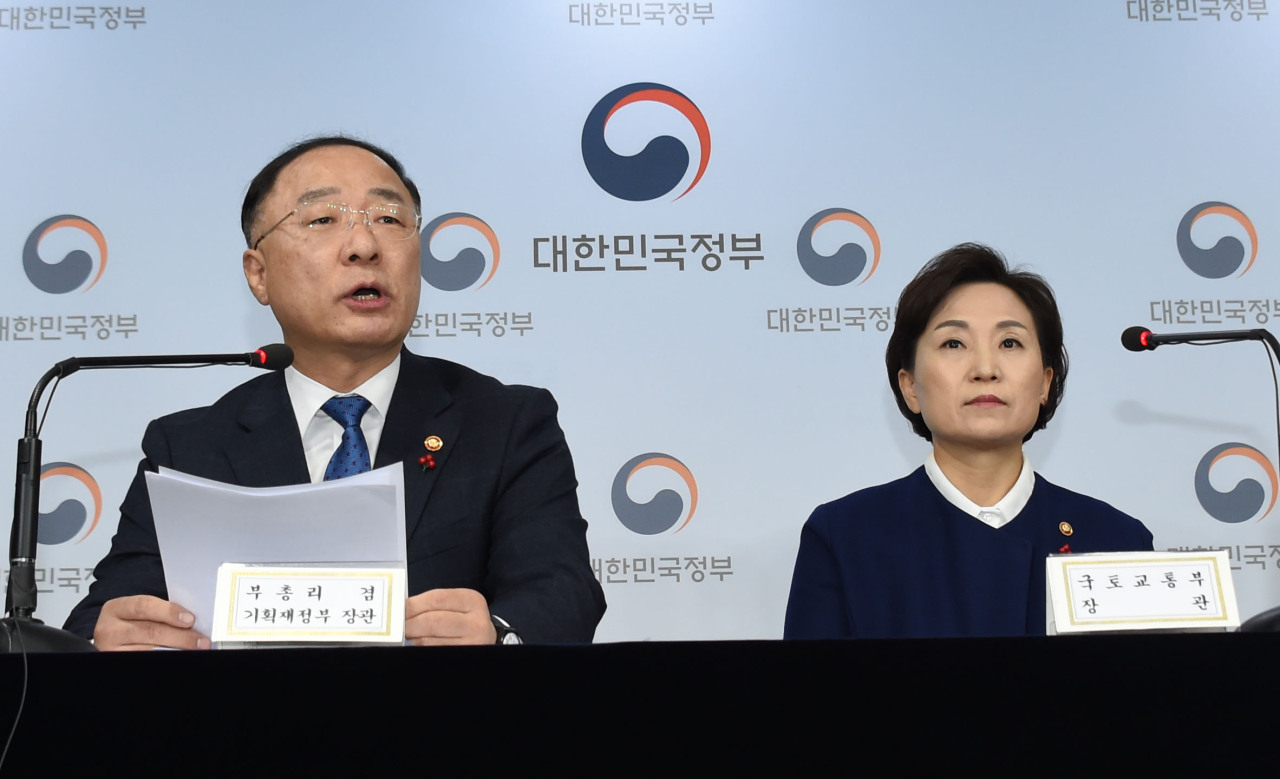Rigid mortgage loan regulations roil real estate market
Finance minister says home owners should be blocked from ‘unearned income whatsoever’
By Bae HyunjungPublished : Dec. 16, 2019 - 16:01
In a surprise move on Monday, the South Korean government announced unprecedented real estate regulations to offset previous ones that have failed to curb rising housing prices.
But as the newly introduced measures largely focus on loan restrictions, skepticism also mounted that the wealthy will continue their speculative buying in cash.
The latest measures include a ban on mortgage loans for apartments priced 1.5 billion won ($1.28 million) or more, effective Wednesday. The real estate tax rate for owners of multiple expensive apartments has also been raised, pushing people to dispose of their surplus assets during the next six months.
But as the newly introduced measures largely focus on loan restrictions, skepticism also mounted that the wealthy will continue their speculative buying in cash.
The latest measures include a ban on mortgage loans for apartments priced 1.5 billion won ($1.28 million) or more, effective Wednesday. The real estate tax rate for owners of multiple expensive apartments has also been raised, pushing people to dispose of their surplus assets during the next six months.

The latest announcement immediately sent shockwaves across the real estate market and particularly the affluent areas of the capital. It is seen as the government’s determination to make a tangible impact in the market, while giving incumbent home owners little time to respond.
It also marked the current administration’s 17th real estate-related policy announcement since President Moon Jae-in took office in May 2017.
“The government is more resolute than ever to stabilize the housing market,” Deputy Prime Minister and Finance Minister Hong Nam-ki in a press briefing held at Seoul Government Complex.
“Unearned revenue through house ownership will not be allowed under any circumstances,” he said, referring to the hike in housing prices.
Starting Tuesday, the designated bubble-prone zones including the capital city will face a reinforced loan regulation which places a mortgage loan ban on all purchases of apartments priced 1.5 billion won or more.
For apartments priced over 900 million won and under 1.5 billion won, authorities have placed a reinforced, segmented loan-to-value ratio.
The conventional LTV for mortgage loans in designated speculative areas stands at 40 percent. Under new rules, however, this figure will be lowered to 20 percent for houses that exceed the 900 million won mark.
Also, the price ceiling system for new apartments will be expanded to most parts of the Seoul-metropolitan area -- 13 districts in Seoul, 13 zones in three Gyeonggi Province regions, and 37 zones in Seoul which are facing redevelopment.
The comprehensive real estate tax rate will be raised by 0.1-0.3 percentage point, depending on the location of the house. The corresponding rate for multiple home owners or those who own houses in designated areas will be 0.2-0.8 percentage point.
Offering a six-month grace period, the government will induce multiple home owners in speculative areas to sell off their surplus properties without transfer tax by end-June.
These strong-handed actions were unexpected and took the local market by surprise.
“It was only this morning that we heard of the government’s imminent announcement of additional (real estate) measures,” said an official of KB Kookmin Bank, one of the major mortgage lenders here.
“Even when we heard about the upcoming announcement, we did not quite expect such a comprehensive range of restrictions.”
Some were skeptic of the measures despite the government’s strong will.
“The latest measures may take some market stabilizing effect in the short term by deterring speculative purchases on loans,” said Kwon Dae-jung, a professor at Myongji University.
“But without a long-term supply action plan, it may only widen the gap (between the haves and have-nots).”
According to the top fiscal policymaker citing the recent price hikes in Seoul, transactions of high-priced houses in bubble-prone areas was the key reason for the overheating market.
“We have observed an increasing trend of speculative purchases using financial leverage and processes which often involve unlawful donation of property or circumvention of loan regulations,” Hong said.
Such overheating may easily expand into the housing market in general and trigger zones in the outskirts to follow suit in the price escalation, according to the minister.
To maximize the impact of the latest measures, the government will swiftly complete the revision of related financial supervisory regulations and tax rules, he added.
“An excessive rise in housing prices deprives homeseekers and widens the socioeconomic gap,” Hong said.
“The market is increasingly doubtful of the government’s capacity and will to implement policy actions.”
Additional comprehensive actions on housing supply and demand will come up during the first half of next year, if necessary, according to the Ministry of Economy and Finance.
The average market price of Seoul apartments has soared 40 percent in the past 2 1/2 years, according to housing information provider Real Estate 114. The average sale price of Seoul apartments stood at 823.76 million won ($690,263) as of the first week of December, up 40.8 percent from 585.24 million in the first half of 2017.
By Bae Hyun-jung (tellme@heraldcorp.com)







![[Graphic News] More Koreans say they plan long-distance trips this year](http://res.heraldm.com/phpwas/restmb_idxmake.php?idx=644&simg=/content/image/2024/04/17/20240417050828_0.gif&u=)
![[KH Explains] Hyundai's full hybrid edge to pay off amid slow transition to pure EVs](http://res.heraldm.com/phpwas/restmb_idxmake.php?idx=644&simg=/content/image/2024/04/18/20240418050645_0.jpg&u=20240419100350)





![[From the Scene] Monks, Buddhists hail return of remains of Buddhas](http://res.heraldm.com/phpwas/restmb_idxmake.php?idx=652&simg=/content/image/2024/04/19/20240419050617_0.jpg&u=20240419175937)

![[KH Explains] Hyundai's full hybrid edge to pay off amid slow transition to pure EVs](http://res.heraldm.com/phpwas/restmb_idxmake.php?idx=652&simg=/content/image/2024/04/18/20240418050645_0.jpg&u=20240419100350)

![[Today’s K-pop] Illit drops debut single remix](http://res.heraldm.com/phpwas/restmb_idxmake.php?idx=642&simg=/content/image/2024/04/19/20240419050612_0.jpg&u=)